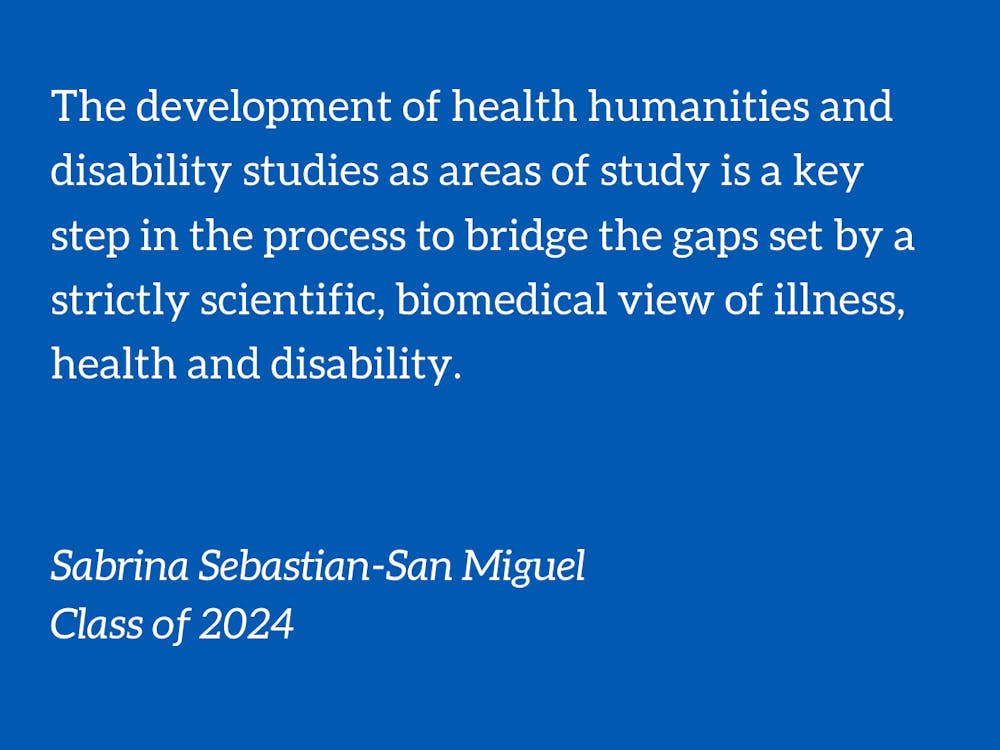As a premedical student with a chronic condition, my own frustrations navigating healthcare, school and overall daily life have guided my pursuits and interests in the medical field. Although my desire to be a doctor is driven by these experiences, at the start of college I thought my premedical studies would be primarily defined by the pure and applied sciences. However, catalyzed by an unexpected change in FOCUS clusters, I started taking more classes, and getting more involved in organizations that gave me more exposure to themes surrounding health humanities and disability studies. The knowledge and experiences I have gotten from these pursuits have been overwhelmingly valuable in shaping the trajectory of my remaining time here at Duke, and my aims for the future. Now, although I still love exploring learning opportunities in the sciences, I want to have equal possibilities to pursue my interests in the health humanities and disability studies.
However, disability narratives and experiences have been largely underrepresented in higher education. This is contrary to estimates that over 1 billion people worldwide are experiencing some form of disability. This approximation is also expected to grow due to the increasing prevalence of chronic health conditions, especially in the wake of the COVID-19 pandemic. As the dominant biomedical systems were historically built to cure acute illnesses, it follows that disability requires new, interdisciplinary frameworks, incorporating the social and cultural ramifications of living with a condition that is instead longstanding. The development of health humanities and disability studies as areas of study is a key step in the process to bridge the gaps set by a strictly scientific, biomedical view of illness, health and disability.
Therefore, it makes sense that 110 universities across the country have begun to establish baccalaureate programs in medical and health humanities, and almost 50 have established undergraduate programs in disability studies. However, Duke, an institution that prides itself on providing an innovative, interdisciplinary curriculum to its students, finds itself behind, as it has not formally integrated either area of study into its list of undergraduate programs.
Consequently, Duke Disability Alliance (DDA), faculty, and students continue to push for the creation of a new disability studies and health humanities minor at Duke.
As mentioned in the last Chronicle article surrounding disability studies, Duke alumnus and former president of DDA Jay Pande “emphasized the fact that Duke has made a sizable effort to facilitate the study of other aspects of identity—such as gender, sexuality, race and ideology—and that disability is also an important part of the human experience to consider.”
Students agree with Pande’s assertion that disability studies and health humanities would be key additions to studies of identities. First, a large number of respondents to a survey of interest in a disability studies and health humanities minor, completed in February of 2020, were pre-health students. Undergraduate programs inclusive of disability studies and health humanities will only help supplement the already strong STEM curricular options for pre-health students, allowing for a more comprehensive understanding of illness narratives, disability experiences and the implications structural and social factors can have on health and wellbeing. Secondly, the same survey also indicated that the proposed minor would be well received among students with a wide variety of interests such as: engineering, technology, policy, environmental studies, social sciences and service.
In response to this student demand growing over the years, Dr. Marion Quirici, co-director of the Health Humanities Lab at the Franklin Humanities Institute and DDA advisor, has worked with Dr. Jules Odendahl-James in Academic Advising to assemble a list of courses that cover a breadth of disability and health humanities topics and themes. All of these already existing courses could be easily integrated into a planned course of study, as is already being done by several Program II students. The difference, however, between taking the classes alongside another major/minor, or doing a Program II, is that the presence of a structured minor will allow students to have established departmental support while conducting their studies. Establishing this departmental support, like that for all the other majors and minors at Duke, is key to providing an advising network and additional learning opportunities for students. The Disability and Health Humanities minor aims to provide a structured way of “studying the social and cultural dimensions of categories of disability, normality, illness and health which is especially urgent in the time of COVID-19, which exacerbates vast inequities rooted in race, ethnicity, class, age, gender, sexuality and health/ability status,” writes Dr. Quirici.
Now, Quirici and other codirectors of the Health Humanities Lab are submitting a formal proposal for a new minor in the Disability and Health Humanities. The proposed minor would allow interested students to pursue the breadth of their curiosity, while facilitating learning and conversations about how to increase accessibility, acceptance and diversity both on campus and beyond.
To support a disability and health humanities minor at Duke, please sign the following petition: https://forms.gle/Gfdu5M4Ljzg4fshZ6.
Sabrina Sebastian-San Miguel is a Trinity sophomore.
Get The Chronicle straight to your inbox
Signup for our weekly newsletter. Cancel at any time.

